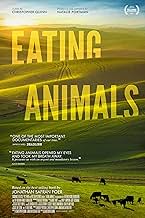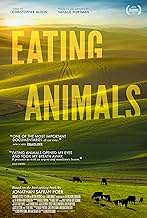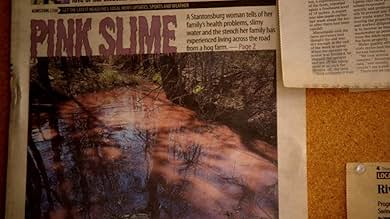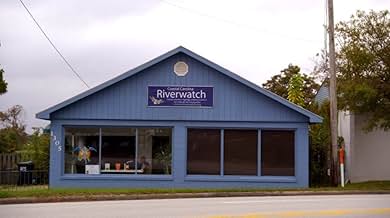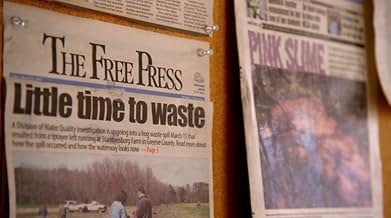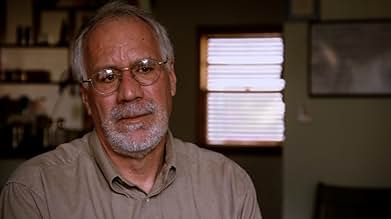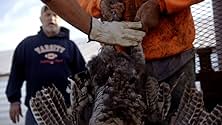NOTE IMDb
7,4/10
1,2 k
MA NOTE
Ajouter une intrigue dans votre langueAn examination of our dietary choices and the food we put in our bodies. Based on Jonathan Safran Foer's memoir.An examination of our dietary choices and the food we put in our bodies. Based on Jonathan Safran Foer's memoir.An examination of our dietary choices and the food we put in our bodies. Based on Jonathan Safran Foer's memoir.
- Réalisation
- Scénario
- Casting principal
Avis à la une
'EATING ANIMALS': Three and a Half Stars (Out of Five)
A feature-length documentary adapted from the critically acclaimed 2009 novel, of the same name (which was also a New York Times best-seller), by Jonathan Safran Foer. The film examines what has happened to our food industry in the last 40-years, as we've transitioned from traditional farming to huge industrial farms. The book was written as an effort for Foer to decide whether his newborn child should eat meat or not. The film was written and directed by Christopher Dillon Quinn, and it's narrated and produced by Oscar winning actress (and filmmaker) Natalie Portman. The documentary had it's world premiere at the Telluride Film Festival last September, where it received a standing ovation. I saw it at a film festival in Portland, followed by a Q&A with the director there. I definitely had severely mixed feelings about the film.
The movie examines what has happened to our food industry over the last forty years, as it's transitioned from traditional farming to massive factory farms. The filmmakers interview multiple farmers, and question them on how this change has affected them (many have been left in financial ruins). It also shows us (through undercover footage primarily) the horrific treatment of animals as a result. Portman also beautifully narrates the film, throughout, as well.
I saw the movie with a group of vegan 'animal rights' activist friends, and they were pretty upset by the overall message of the film. They feel that it promotes the myth of 'humanely' raised meat and dairy, and it encourages a transition back to more traditional farming, rather than veganism. I didn't feel that was the overall message (from my biased point of view) when I first watched it, but I can definitely see why they feel that way. I still saw it as a movie which primarily promotes veganism. There's a lot of important educational information in it, including lots of animal abuse footage, and it definitely (without a doubt) paints factory farming in a very negative and horrific light. The film has a lot of flaws still though (obviously), and it's certainly far from a great movie.
A feature-length documentary adapted from the critically acclaimed 2009 novel, of the same name (which was also a New York Times best-seller), by Jonathan Safran Foer. The film examines what has happened to our food industry in the last 40-years, as we've transitioned from traditional farming to huge industrial farms. The book was written as an effort for Foer to decide whether his newborn child should eat meat or not. The film was written and directed by Christopher Dillon Quinn, and it's narrated and produced by Oscar winning actress (and filmmaker) Natalie Portman. The documentary had it's world premiere at the Telluride Film Festival last September, where it received a standing ovation. I saw it at a film festival in Portland, followed by a Q&A with the director there. I definitely had severely mixed feelings about the film.
The movie examines what has happened to our food industry over the last forty years, as it's transitioned from traditional farming to massive factory farms. The filmmakers interview multiple farmers, and question them on how this change has affected them (many have been left in financial ruins). It also shows us (through undercover footage primarily) the horrific treatment of animals as a result. Portman also beautifully narrates the film, throughout, as well.
I saw the movie with a group of vegan 'animal rights' activist friends, and they were pretty upset by the overall message of the film. They feel that it promotes the myth of 'humanely' raised meat and dairy, and it encourages a transition back to more traditional farming, rather than veganism. I didn't feel that was the overall message (from my biased point of view) when I first watched it, but I can definitely see why they feel that way. I still saw it as a movie which primarily promotes veganism. There's a lot of important educational information in it, including lots of animal abuse footage, and it definitely (without a doubt) paints factory farming in a very negative and horrific light. The film has a lot of flaws still though (obviously), and it's certainly far from a great movie.
If you consume meat, please watch. It's more than pro-vegetarian, it shows the negative effects mass animal farming has on the land and the animals that are consumed.
Don't google, "pink lagoon" especially if you live in NC...
Informative without using sensationalism.
Greetings again from the darkness. Our food supply and sources have become a deserved focal point of interest over the past few years, and director Christopher Quinn brings the 2009 best- selling book by Jonathan Safran Foer to the big screen to ensure we are paying attention. What began as a project looking at how animals were raised to fulfill the demand for edible meat, evolved into an analysis of traditional farming methods versus today's prevalent factory/big corporation farming. We learn that the growing demand for affordable and convenient food in the 1970's really kicked off the factory farming industry, and now it's roughly 99% of the market. Only 1% of farmers resisted and survived (as farmers).
"We eat meat not because of how it's produced, but in spite of it." Consumers demand delicious, affordable and convenient food, and the film looks at beef, chicken, turkey, pigs and dairy. We are told that factory farming began accidentally thanks to an overshipment of baby chicks several decades ago. Farming and our food supply haven't been the same since. There is some rare behind-the-scenes footage from factory farms that is difficult to watch. Narrator and Producer (Oscar winning actress) Natalie Portman talks us through the disgusting "pink lagoons" of hog poop, as well as how the raising of animals for food is said to be responsible for up to half of climate change, and for having a significantly negative impact on air pollution and water quality.
Of course most people, when asked, are against animal abuse and geological degradation so what goes on "inside" the barns remains confidential and secure. Going behind the doors of Confined Animal Feeding Operations, we witness conditions and actions that we would prefer not to see. We are informed that 80% of the anti-biotics being produced go towards farm factory animals, and the goal is to modify normal growth size and speed by 4 times. With this approach comes increased risk of pandemics, superbugs, and flu viruses. That's our tradeoff for the delicious, affordable and convenient demands.
The USDA comes under attack here as well. The agency is accused of silencing the whistleblowers who are doing the job the agency was created to do. They are now 'protecting the fox, not the hen house'. This is all tracked back to politics and money from the big corporations affiliated with or benefitting from factory farming. Some old clips of Col Harland Sanders (of KFC fame) proves even he was concerned about this many years ago.
Emotion comes into play here as the connection of traditional farmers to their animals is contrasted to the mass production of farm factories. Industry secrecy and protection is presented as a red flag, and the independent farmers are shown as good guys while the giant corporations remain faceless and (mostly) nameless. Only towards the end of the film do we gain some insight into the research being conducted on meat replication through plant-based systems. It's brilliantly compared to the early days of "gas light substitute" as a name for Edison's electricity. We are told that India and China now combine to total almost 3 billion people, and their diets are trending towards that of the U.S. - leading to more pressure for faster and cheaper food. Traditional farming isn't even taught in school these days, and the film barely touches on the always on-going debate between "humanely" raising animals for food vs. veganism. The film succeeds in showing us the problems, but doesn't offer much in the way of solutions or even a better way ... although it's clear one is needed.
"We eat meat not because of how it's produced, but in spite of it." Consumers demand delicious, affordable and convenient food, and the film looks at beef, chicken, turkey, pigs and dairy. We are told that factory farming began accidentally thanks to an overshipment of baby chicks several decades ago. Farming and our food supply haven't been the same since. There is some rare behind-the-scenes footage from factory farms that is difficult to watch. Narrator and Producer (Oscar winning actress) Natalie Portman talks us through the disgusting "pink lagoons" of hog poop, as well as how the raising of animals for food is said to be responsible for up to half of climate change, and for having a significantly negative impact on air pollution and water quality.
Of course most people, when asked, are against animal abuse and geological degradation so what goes on "inside" the barns remains confidential and secure. Going behind the doors of Confined Animal Feeding Operations, we witness conditions and actions that we would prefer not to see. We are informed that 80% of the anti-biotics being produced go towards farm factory animals, and the goal is to modify normal growth size and speed by 4 times. With this approach comes increased risk of pandemics, superbugs, and flu viruses. That's our tradeoff for the delicious, affordable and convenient demands.
The USDA comes under attack here as well. The agency is accused of silencing the whistleblowers who are doing the job the agency was created to do. They are now 'protecting the fox, not the hen house'. This is all tracked back to politics and money from the big corporations affiliated with or benefitting from factory farming. Some old clips of Col Harland Sanders (of KFC fame) proves even he was concerned about this many years ago.
Emotion comes into play here as the connection of traditional farmers to their animals is contrasted to the mass production of farm factories. Industry secrecy and protection is presented as a red flag, and the independent farmers are shown as good guys while the giant corporations remain faceless and (mostly) nameless. Only towards the end of the film do we gain some insight into the research being conducted on meat replication through plant-based systems. It's brilliantly compared to the early days of "gas light substitute" as a name for Edison's electricity. We are told that India and China now combine to total almost 3 billion people, and their diets are trending towards that of the U.S. - leading to more pressure for faster and cheaper food. Traditional farming isn't even taught in school these days, and the film barely touches on the always on-going debate between "humanely" raising animals for food vs. veganism. The film succeeds in showing us the problems, but doesn't offer much in the way of solutions or even a better way ... although it's clear one is needed.
Always glad to see people spreading the word about how horrible the animal industry is. I just wish they didn't sympathize with the small farmers and make people think "humane meat" is a thing. There is no way to humanely kill someone who wants to live.
This documentary takes you on a journey that makes you question your eating choices. What type meat you want to eat having looked at the conditions of the current animal farming, breeding and meat processing locations. It makes you question the need of meat in your own life and should one make an informed choice on where to get it from , reduce consumption or even move to plant based alternatives. Having watched it, I am questioning the source of my meat and if I have to make a better choice for my own life atleast.
I will suggest: just watch it without assumptions in your mind and see where it takes you. And ask questions to yourself along the way.
I will suggest: just watch it without assumptions in your mind and see where it takes you. And ask questions to yourself along the way.
Le saviez-vous
- AnecdotesAs a result of her involvement in the film, narrator Natalie Portman alongside her entire family, adopted a vegan lifestyle.
- Citations
Self (Center for a Livable Future): We are creating the perfect storm. I mean, it's, it's not if, it's when there's going to be another really dangerous flu virus.
Meilleurs choix
Connectez-vous pour évaluer et suivre la liste de favoris afin de recevoir des recommandations personnalisées
- How long is Eating Animals?Alimenté par Alexa
Détails
Box-office
- Montant brut aux États-Unis et au Canada
- 149 614 $US
- Week-end de sortie aux États-Unis et au Canada
- 34 524 $US
- 17 juin 2018
- Montant brut mondial
- 153 993 $US
- Durée
- 1h 34min(94 min)
- Couleur
Contribuer à cette page
Suggérer une modification ou ajouter du contenu manquant


